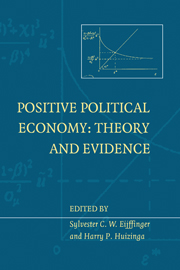Introduction
Published online by Cambridge University Press: 05 September 2013
Summary
Positive political economy investigates how observed differences in institutions affect political and economic outcomes in various social, economic and political systems. It also inquires how the institutions themselves change and develop in response to individual and collective beliefs, preferences and strategies. As stated by Persson and Tabellini (1990) in their book on macroeconomics and politics: “The future research agenda ought to give high priority to modeling the details of political institutions. Adding institutional content is necessary to sharpen the empirical predictions of the theory.” The essays on political economy collected in this volume aim to be part of this research agenda.
The modern theory of macroeconomic policy, and of monetary policy in particular, focuses on the game-theoretic interactions between private agents and policy makers where the private sector rationally anticipates economic policy. The variety of interests at stake in the conduct of monetary and exchange rate policy renders it a fertile area for political economists. At the same time, monetary institutions are currently in a state of flux, especially in Europe. The prospect of a European Monetary Union by January 1999 has heightened the interest in the design of central banking institutions, while a renewed popularity of fixed exchange rate regimes worldwide has prompted a fresh academic interest in the choice between fixed and flexible exchange rates and in the determination of capital controls.
The CentER for Economic Research of Tilburg University organized an international conference with the title “Positive political economy: theory and evidence” on January 23–4, 1995.
- Type
- Chapter
- Information
- Positive Political EconomyTheory and Evidence, pp. 1 - 6Publisher: Cambridge University PressPrint publication year: 1998



